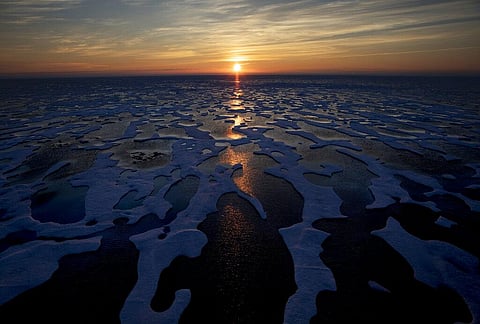

BENGALURU : A scientist from Raman Research Institute (RRI), Bengaluru, has found the Arctic region a worthy site for study on the cosmic dawn using an indigenous radio telescope because of its pristine location and radio remoteness.
Cosmic dawn is the period from about 100 million years to one billion years after the Big Bang when the first stars, black holes, and galaxies in the universe were formed.
Research scientist Dr BS Girish, who led India’s maiden winter research team to the Arctic, told TNIE that he characterised the frequency environment in which RRI-developed SARAS radio telescope operated and found the vicinity in and around Himadri, India’s research station in the Arctic, a promising site for deployment. He returned to Bengaluru on January 19.
“Girish’s project was to study radio interference levels in the Arctic. The radio frequency interference scenario in Ny-Ålesund (the global research station) in Svalbard, Norway, was sampled at different times of the day,” said Saurabh Singh, assistant professor, Astronomy & Astrophysics, RRI.
If approved, India may lead study on cosmic dawn
“OUR initial analysis suggests that the site is promising for deployment of SARAS given the radio quietness. The RRI has submitted a proposal to the National Centre for Polar and Ocean Research (NCPOR), Goa, which is the nodal agency for the Arctic expedition, to deploy SARAS in the Arctic to study the cosmic dawn,” said Saurabh Singh.
If NCPOR approves the proposal, India may lead the study on cosmic dawn, which is one of the most important gaps in our understanding of our universe’s history. SARAS is a niche high-risk, high-gain experimental effort of RRI initiated to detect extremely faint radio wave signals from the depths of spacetime -- the cosmic dawn.
Singh, who is the principal investigator of the SARAS project, said the SARAS team has been looking for pristine sites within India to deploy the radio telescope. “Before the Arctic experiment, we had looked at Ladakh and the region around Shivamogga in Karnataka, but terrestrial interference was a major bottleneck.
In Shivamogga,our goal was to test the claim of detecting anomalous signals by scientists from Arizona State University (ASU) and Massachusetts Institute of Technology (MIT). In fact, our team was the first to reach the required sensitivity to cross verify their claim and refute it,” he added.